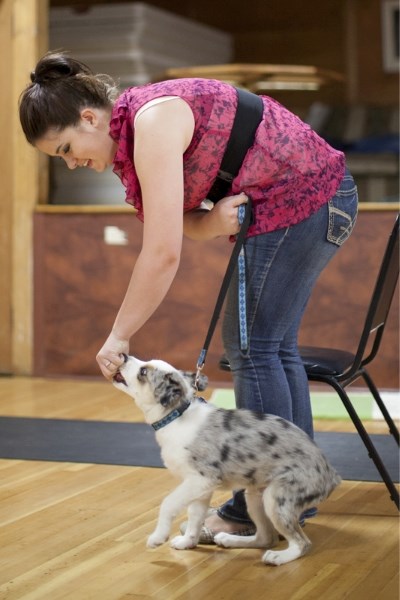Rugby Hall is now into the fourth week of hosting canine obedience training classes and the pups are developing well, says organizer Della Kyncl.From a full-grown Great Dane to an Australian shepherd puppy, the dogs are learning from one of the best. Participants have come from all over to train their dogs at the hall in the Elkton/Rugby area of Mountain View County.Kyncl explained the classes got started after she asked her friend and professional dog trainer Sheena Melone to run the classes, and, after considering the offer for a while, Melone finally broke down and decided to take charge.Kyncl, a dog owner herself who trains dogs for the local 4-H club, explained that rather than just training the dogs, Melone teaches the owners how to train their dogs, which she says is the key to successful dog ownership.She said basic dog obedience training consists of five key elements: “Sit, stay, down, recall, and heel.”After those are mastered, everything just gets easier, she noted.There are three classes currently running at Rugby Hall: conformation, which is for dog shows; obedience, which is for anybody that wants to have a little bit of manners in their home; and obstacle obedience.Kyncl gave an example of obstacle obedience training: heeling on a leash, doing an about-face, and lying down.“It's not actual obstacles like agility, we do that in 4-H, where kids start with basic obedience which then leads up to agility,” she said.At a recent session, a few dogs in the room were wearing choke chains, both with the barbs and without. Kyncl explained that when used properly, the barbs do not cause the dogs harm, because the barbs simply pinch the skin, not dig in like many people may believe.“With a pinch collar, you gain control until you have the dog's respect,” she said, “They (collars) are not meant for everyday use.”She noted that once owners have the respect of the dog, just the sound of the chain rattling in the shank will be enough to make it obey, which is when you graduate the dogs from a pinch collar to a simple choke chain, which makes the same noise, without the pain.Training is the key to having a well-mannered dog, said Kyncl.“A dog that is out of control is all fun and games to some people, until they run out onto the road or bite a kid. Sport dogs tend to think that kids are toys, they may drag kids around in their jaws and the kid thinks it's fun, until the dog bites too hard,” she said.“That's why even farm dogs that rarely go inside should still have some basic training.”Sheena Melone, who teaches the beginner's class at Rugby Hall, works as a groomer during the day out of her Red Deer home under the name “Clip Dog Grooming.”She started training dogs in the early 1970s, because, she said, “In the course of training my own dog, my instructor just said ‘you have a natural aptitude for it' and here I am, many years later.”There was no work in those days in her hometown of Port Alberni, B.C., so she moved to Alberta. She ended up meeting her future husband here and so she stayed in the province, raised her family, and ran her business.“I teach obedience, I teach rally obedience, agility, and conformation too,” said Melone, “I have anywhere between 30 and 60 students a week, depending on how much time I have. You can do agility training almost every weekend in Alberta if you wanted to.”She said her favourite part of training is, “watching them come in, seeing them come in the very first night, watching them progress, and seeing what the dogs become.“These guys are all diamonds in the rough, but as the training goes on, their whole life with their dogs is enhanced.”



